
巴勒斯坦激进组织哈马斯突然对以色列多地发动袭击,这可能引发以色列对加沙地带的大规模军事报复,战火甚至可能蔓延到中东地区以外。
哈马斯对以色列进行了渗透,逮捕了士兵和平民,并发射了数千枚火箭弹。这次突然袭击正值一个外交敏感时期,而且选在了以色列脆弱的时刻。一直有分析师警告敌人可能抓住这段时间攻击以色列。
以色列正在与美国和沙特谈判一项复杂的三边协议。根据该协议,美国政府将为沙特提供安全保障。而沙特则将与以色列实现关系正常化。以色列还在与土耳其和其他国家讨论向欧洲出口天然气以及亚洲贸易走廊的问题。
以色列内部的政治动荡导致其处于脆弱状态。去年4月,以色列遭到从加沙、黎巴嫩和叙利亚发射的火箭弹的攻击,曾短暂同时三面受敌。冲突的导火索是以色列犹太人进入了耶路撒冷阿克萨清真寺。过去一周也发生了同样的情况。
前以色列国家安全顾问吉奥拉·艾兰德在记者简报会上表示:“我不能排除以色列同时面对多个战场的可能性,这将对以色列造成极其严重的威胁。”但他表示,以色列更倾向于一次面对一个敌人,不会很快与其他方交战。
几个月来,以色列官方一直表示,伊朗支持和资助的巴勒斯坦激进组织正在策划暴力行动,以色列已经做好了反击的准备。尽管如此,周六在安息日和犹太人节日发生的攻击,令以色列措手不及,这会加剧受伤害的感觉,从而影响以色列的反击。
战争状态
以色列总理本杰明·内塔尼亚胡是国内每周一次反政府示威的焦点。在以色列遭遇攻击之后,他可能找到一个团结全国的机会,争取反对派的支持,做出强有力的回应。计划在周六晚上举行的反政府示威已被取消。
内塔尼亚胡在录制的视频声明中表示:“以色列公民们,我们处于战争状态。这不是一次军事行动,也不是几轮相互攻击。我们处于战争状态。”他还表示:“敌人将付出前所未有的代价。”
此次冲突可能进一步影响以色列金融市场。今年,政府弱化法官权力的计划遭到大规模抗议,已经冲击到以色列金融市场。以色列货币谢克尔兑美元贬值了约9%,这是彭博社跟踪的主要货币中表现最糟糕的货币之一,与此同时,对以色列科技行业的投资大幅减少。
以色列上一次在加沙地带对哈马斯发起大规模军事行动是在2014年。行动持续了七周,造成2,000多名巴勒斯坦人和数十名以色列人死亡。
约旦河西岸风险
以色列与沙特的协议中预计涉及以色列在约旦河西岸相关事务上做出让步,以增强巴勒斯坦当局的权力和增加巴勒斯坦独立建国的可能性。如果最近的袭击导致以色列对约旦河西岸地区发起军事行动,这条协议可能变得岌岌可危。
沙特之所以希望美国做出安全保障,部分原因是其自身对伊朗的担忧。如果伊朗被证实参与了周六对以色列的攻击并且扮演了关键角色,这可能会影响谈判的结果。
目前已经确认冲突造成以色列40人死亡,数百人受伤。以色列动员了成千上万的预备役军人。在加沙,哈马斯卫生部门表示,以色列的报复行动造成了500人受伤入院。
在哈马斯入侵以色列几个小时后,以色列士兵仍在南部五六个城镇和至少一座军事基地与敌军交火。哈马斯的武装人员似乎占领了以色列境内的一座集体农场,并将以色列人作为俘虏。
此次袭击被普遍认为是自50年前,叙利亚和埃及突然对以色列发起战争以来,以色列国防方面最严重的漏洞,这给内塔尼亚胡带来了更大压力。
前以色列军方发言人乔纳森·康利克斯表示:“这看起来像是以色列情报部门的一次巨大失误。我们看得出来,此次袭击经过长期缜密的策划,情报部门本应能发现蛛丝马迹。这是非常棘手的问题,必须给出艰难的答案。”
伊朗问题
康利克斯至少间接谴责伊朗在幕后支持此次攻击,而且他猜测以色列可能不止在加沙地带做出回应。
在伊朗支持的激进组织真主党所在的黎巴嫩边境,以色列军方正在增强防御,并密切关注约旦河西岸以色列占领区的状况。
以色列军方发言人理查德·赫克特中校表示,哈马斯通过陆路、海路和空中发动袭击,以色列将对此次意外行动展开调查。
曾在军事情报部门任职的退休中校米利·艾森表示,现在的问题是冲突会如何升级。艾森目前是以色列赖赫曼大学(Reichman University)一家反恐研究院的负责人。她说道,这是否会引发更大规模的战争,这是“一个至关重要的问题。如果伊朗参与了此次袭击,我们是否为应对下一个阶段的行动,提前做好了准备?”(财富中文网)
—— 本文得到了加利特·阿尔斯通和保罗·华莱士的协助。
翻译:刘进龙
审校:汪皓
巴勒斯坦激进组织哈马斯突然对以色列多地发动袭击,这可能引发以色列对加沙地带的大规模军事报复,战火甚至可能蔓延到中东地区以外。
哈马斯对以色列进行了渗透,逮捕了士兵和平民,并发射了数千枚火箭弹。这次突然袭击正值一个外交敏感时期,而且选在了以色列脆弱的时刻。一直有分析师警告敌人可能抓住这段时间攻击以色列。
以色列正在与美国和沙特谈判一项复杂的三边协议。根据该协议,美国政府将为沙特提供安全保障。而沙特则将与以色列实现关系正常化。以色列还在与土耳其和其他国家讨论向欧洲出口天然气以及亚洲贸易走廊的问题。
以色列内部的政治动荡导致其处于脆弱状态。去年4月,以色列遭到从加沙、黎巴嫩和叙利亚发射的火箭弹的攻击,曾短暂同时三面受敌。冲突的导火索是以色列犹太人进入了耶路撒冷阿克萨清真寺。过去一周也发生了同样的情况。
前以色列国家安全顾问吉奥拉·艾兰德在记者简报会上表示:“我不能排除以色列同时面对多个战场的可能性,这将对以色列造成极其严重的威胁。”但他表示,以色列更倾向于一次面对一个敌人,不会很快与其他方交战。
几个月来,以色列官方一直表示,伊朗支持和资助的巴勒斯坦激进组织正在策划暴力行动,以色列已经做好了反击的准备。尽管如此,周六在安息日和犹太人节日发生的攻击,令以色列措手不及,这会加剧受伤害的感觉,从而影响以色列的反击。
战争状态
以色列总理本杰明·内塔尼亚胡是国内每周一次反政府示威的焦点。在以色列遭遇攻击之后,他可能找到一个团结全国的机会,争取反对派的支持,做出强有力的回应。计划在周六晚上举行的反政府示威已被取消。
内塔尼亚胡在录制的视频声明中表示:“以色列公民们,我们处于战争状态。这不是一次军事行动,也不是几轮相互攻击。我们处于战争状态。”他还表示:“敌人将付出前所未有的代价。”
此次冲突可能进一步影响以色列金融市场。今年,政府弱化法官权力的计划遭到大规模抗议,已经冲击到以色列金融市场。以色列货币谢克尔兑美元贬值了约9%,这是彭博社跟踪的主要货币中表现最糟糕的货币之一,与此同时,对以色列科技行业的投资大幅减少。
以色列上一次在加沙地带对哈马斯发起大规模军事行动是在2014年。行动持续了七周,造成2,000多名巴勒斯坦人和数十名以色列人死亡。
约旦河西岸风险
以色列与沙特的协议中预计涉及以色列在约旦河西岸相关事务上做出让步,以增强巴勒斯坦当局的权力和增加巴勒斯坦独立建国的可能性。如果最近的袭击导致以色列对约旦河西岸地区发起军事行动,这条协议可能变得岌岌可危。
沙特之所以希望美国做出安全保障,部分原因是其自身对伊朗的担忧。如果伊朗被证实参与了周六对以色列的攻击并且扮演了关键角色,这可能会影响谈判的结果。
目前已经确认冲突造成以色列40人死亡,数百人受伤。以色列动员了成千上万的预备役军人。在加沙,哈马斯卫生部门表示,以色列的报复行动造成了500人受伤入院。
在哈马斯入侵以色列几个小时后,以色列士兵仍在南部五六个城镇和至少一座军事基地与敌军交火。哈马斯的武装人员似乎占领了以色列境内的一座集体农场,并将以色列人作为俘虏。
此次袭击被普遍认为是自50年前,叙利亚和埃及突然对以色列发起战争以来,以色列国防方面最严重的漏洞,这给内塔尼亚胡带来了更大压力。
前以色列军方发言人乔纳森·康利克斯表示:“这看起来像是以色列情报部门的一次巨大失误。我们看得出来,此次袭击经过长期缜密的策划,情报部门本应能发现蛛丝马迹。这是非常棘手的问题,必须给出艰难的答案。”
伊朗问题
康利克斯至少间接谴责伊朗在幕后支持此次攻击,而且他猜测以色列可能不止在加沙地带做出回应。
在伊朗支持的激进组织真主党所在的黎巴嫩边境,以色列军方正在增强防御,并密切关注约旦河西岸以色列占领区的状况。
以色列军方发言人理查德·赫克特中校表示,哈马斯通过陆路、海路和空中发动袭击,以色列将对此次意外行动展开调查。
曾在军事情报部门任职的退休中校米利·艾森表示,现在的问题是冲突会如何升级。艾森目前是以色列赖赫曼大学(Reichman University)一家反恐研究院的负责人。她说道,这是否会引发更大规模的战争,这是“一个至关重要的问题。如果伊朗参与了此次袭击,我们是否为应对下一个阶段的行动,提前做好了准备?”(财富中文网)
—— 本文得到了加利特·阿尔斯通和保罗·华莱士的协助。
翻译:刘进龙
审校:汪皓
Rescue teams at work near the southern city of Sderot on Saturday after the Palestinian militant group Hamas launched a large-scale surprise attack on Israel.
A surprise multifront attack on Israel by the Palestinian group Hamas will likely lead to a massive military retaliation on Gaza and possibly to a wider conflagration with repercussions beyond the Middle East.
The flare-up — involving infiltrations, capture of soldiers and civilians, and thousands of rockets — comes at a time of enormous diplomatic sensitivity and a moment of weakness for Israel that analysts have been warning its enemies might seek to exploit.
The country is in negotiations with the US and Saudi Arabia on a complex three-way deal in which Washington would offer security guarantees to Riyadh. The Saudis, for their part, would normalize relations with Israel. Israel has also been talking with Turkey and others about gas exports to Europe along with corridors for trade from Asia.
Internally, Israel has been embroiled in political turmoil that left it vulnerable. Last April, the nation found itself briefly engaged on three fronts simultaneously — Gaza, Lebanon and Syria — after rocket fire came from all three. Part of the trigger was that Israeli Jews entered the grounds of the al Aqsa mosque compound in Jerusalem. This past week, that too occurred.
“I can’t exclude a multi arena war that will cause a very very severe threat to the state of Israel,” Giora Eiland, a former national security adviser in Israel, said in a briefing with journalists. He added, though, that Israel prefers to fight one enemy at a time and would not be quick to open another front.
Israeli officials have been saying for months that Palestinian militant groups, guided and funded by Iran, were preparing for violence and that Israel was ready to strike back. That said, Saturday’s attack on the Sabbath and Jewish holiday caught the country distinctly by surprise, adding to a sense of injury that could feed its response.
Nation at War
Prime Minister Benjamin Netanyahu, the focus of the weekly anti-government demonstrations, will likely find a moment of national unity after the attack, leading opposition politicians to back a strong response. The protest that was due to take place on Saturday night was called off.
“Citizens of Israel, we are at war,” Netanyahu said in a videotaped statement. “Not in an operation. Not some back-and-forth. At war.” He added: “The enemy will pay a price it has never known.”
The conflict could further weigh on Israeli financial markets, which have been roiled this year due to mass protests against a government plan to weaken the power of judges. The shekel is down almost 9% against the dollar, one of the worst performances among major currencies tracked by Bloomberg, while investment in Israel’s tech sector has plunged.
The last major Israeli military operation against Hamas in Gaza was in 2014. It lasted for seven weeks and killed more than 2,000 Palestinians there along with dozens of Israelis.
West Bank Risk
Part of the Saudi deal is expected to involve Israeli concessions in the West Bank to strengthen the Palestinian Authority and add to the possibility of an independent Palestinian state. That arrangement will be in jeopardy should the latest fighting lead Israel to extend its operation into the West Bank.
Saudi Arabia wants US protection assurances partly because of its own concerns about Iran. If Iran is shown to be playing a key role in Saturday’s attack on Israel, that could affect those negotiations.
In the current fighting, 40 deaths have been confirmed in Israel as have hundreds of wounded. Thousands of Israeli reservists have been called up. In Gaza, the Hamas health ministry said Israeli retaliatory strikes had injured more than 500 who’d been taken to hospital.
Hours after the infiltrations began, Israeli soldiers were still in live-fire confrontations in half a dozen towns in the south and at least one military base. Hamas operatives seemed to have taken over a collective farm inside Israel, taking Israelis captive.
Adding to the pressure on Netanyahu, the attack is being widely described as the worst lapse of Israeli defense since Syria and Egypt launched an unexpected war on the country 50 years ago.
“This appears to be a colossal intelligence failure by the Israeli establishment,” said Jonathan Conricus, a former Israeli military spokesman. “What we are seeing indicates long and meticulous planning that should have been picked up. Very tough questions are being asked and hard answers will have to be given.”
Iran Question
Conricus blamed Iran, at least indirectly, for being behind the attack and speculated that the Israeli response could spread beyond Gaza.
The military is ramping up its defenses near the border with Lebanon where Iranian-backed militant group Hezbollah operates and is also paying close attention to developments in the occupied West Bank.
Lieutenant-Colonel Richard Hecht, a spokesman for the Israel Defense Forces, said the infiltrators came via road, sea and air and that the surprise of the operation would be investigated.
The issue now is how the confrontation escalates, said Miri Eisen, a retired colonel who worked in military intelligence and now runs a counter-terrorism institute at Reichman University in Israel. Whether this will lead to a bigger war “is the $64,000 question,” she said. “If Iran has a finger in this, do we now preempt against the next stage?”
— With assistance by Galit Altstein and Paul Wallac






